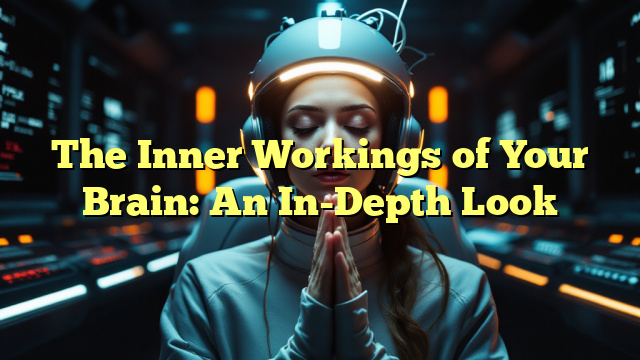Have you ever wondered how your brain functions on a daily basis? The human brain is a complex organ that controls everything we do, from breathing to decision-making. In this article, we will take an in-depth look at the inner workings of your brain and explore some of the fascinating processes that occur inside your head.
Neurons and Neurotransmitters
At the core of the brain's functionality are neurons, specialized cells that transmit information through electrical and chemical signals. Neurons communicate with each other through neurotransmitters, which are chemicals that carry messages between neurons.
When a neuron receives a signal, it generates an electrical impulse that travels down its length to the end of the cell, where neurotransmitters are released into the synapse, the small gap between neurons. The neurotransmitters then bind to receptors on the neighboring neuron, triggering a response in that cell.
The Central Nervous System
The brain is part of the central nervous system, which also includes the spinal cord. The brain and spinal cord work together to coordinate all bodily functions and respond to external stimuli. The brain is divided into different regions, each responsible for specific functions such as motor control, sensory processing, and higher cognitive abilities.
Information is processed in the brain through a series of neural networks that connect different regions and allow for complex behaviors and thoughts to occur. These networks are constantly adapting and changing in response to new experiences and information.
The Role of the Brain in Emotions and Memory
The brain plays a crucial role in regulating emotions and storing memories. The limbic system, located in the center of the brain, is responsible for processing emotions and forming memories. The amygdala, a key structure in the limbic system, is involved in the processing of fear and other emotions.
Memory formation occurs in several stages, including encoding, storage, and retrieval. The hippocampus, another structure in the limbic system, is crucial for forming new memories and consolidating them for long-term storage.
The Impact of Neuroplasticity
One of the most fascinating aspects of the brain is its ability to change and adapt in response to experiences. This phenomenon, known as neuroplasticity, allows the brain to reorganize itself by forming new neural connections and pathways.
Neuroplasticity plays a crucial role in learning and memory, as well as in recovery from brain injuries and neurological disorders. By engaging in activities that challenge the brain, such as learning a new skill or language, individuals can promote neuroplasticity and improve cognitive function.
Conclusion
The human brain is a remarkable organ that controls all aspects of our lives. From regulating basic bodily functions to processing complex thoughts and emotions, the brain plays a central role in who we are as individuals. By understanding the inner workings of the brain, we can gain insights into how our minds operate and how we can optimize brain health and function.
Frequently Asked Questions
Q: Can the brain regenerate cells?
A: While the brain does not regenerate neurons like other parts of the body, it does have the capacity to form new connections between existing neurons, a process known as neurogenesis.
Q: How can I improve my brain health?
A: Engaging in activities that challenge the brain, such as puzzles, games, and learning new skills, can help improve cognitive function and promote brain health. Additionally, maintaining a healthy lifestyle with regular exercise, a balanced diet, and adequate sleep can support brain health.
Q: What role do genetics play in brain function?
A: While genetics can influence certain aspects of brain function, such as susceptibility to certain neurological disorders, the brain is highly adaptable and shaped by environmental factors and experiences.
Unlock Your Mental Potential




